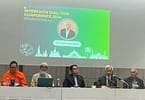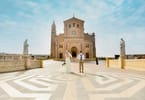Today the 2+ million members of the global eTurboNews travel and tourism-friendly family wish to greet all readers celebrating Eid Mubarak.
Muslim-friendly tourism refers to travel that adheres to Islamic principles. It has four characteristics: Islamic services, Islamic morals in general, Halalness, and the prohibition of gambling and alcohol.
Halal Tourism is one of the fastest growing sector of the industry.
Sharia tourism is a method of incorporating Islamic traditions into all facets of tourism operations.
Muslims are encouraged to travel to see the greatness of Allah’s creation, strengthen mental health and spiritual significance, and appreciate Allah SWT’s creations.
The tourist sector is widely recognized as one of the most critical drivers of economic growth, with Halal and Islamic tourism emerging as a new tourism business idea throughout the world.
Historically, the adventure to Mecca in Saudi Arabia is regarded as a pilgrimage and ‘umrah.
Islam is the world’s second, fastest-growing, and most widely practiced religion. Today there are 1,703,146,000 Muslims in the world.
This religion is based on the Quran, a religious text that followers of Islam believe is the direct word of God.
Under Islam, Muhammad is considered the last Prophet of God, and most believers adhere to his teachings. Followers of Islam are called Muslims.
Friday launches the most important holiday for the Muslim community around the world.
Historians believe that the practice of Islam originated in Mecca and Medina of Saudi Arabia during the early 7th century AD. Around this time, Muhammad began to share messages from the Archangel Gabriel, who God had sent.
Muhammad preached and spread the message from God to people in and around Mecca. He gained a large following, and some of his followers wrote down the revelations in what today is known as the Quran.
Political authorities of the area persecuted Muhammad and his followers.
They feared that Muhammad’s ideas about racial equality and a world with one God would cause instability among the lower class and slave populations. This persecution forced the new Muslims to migrate to Abyssinia (present-day Ethiopia and Eritrea).
After several years of persecution, Muhammad, his family, and the religious converts migrated to Medina in present-day Saudi Arabia. Once in Medina, Muhammad established a political state that adhered to the teachings of Islam. People from several religions came together in this community, called Ummah.
After Muhammad’s death, the religion split concerning disagreements over the proper successors, and Islam gradually began to spread.
Today, Muslims living in non-Muslim countries can stay connected because of advanced communications technology. This allows them to feel they belong to a broader Islamic identity throughout the Muslim World.
Today, Muslims can be found in nearly every country on Earth. Some of these countries, however, have a larger population than others. The top ten largest Muslim populations can be found in: Indonesia (204,847,000), Pakistan (178,000,000), India (172,000,000), Bangladesh (145,607,000), Nigeria (93,839,000), Iran (74,819,000), Turkey (74,660,000), Egypt (73,800,000), Algeria (34,780,000), and Morocco (32,381,000).
Of this list, there are only two countries in which Muslims do not make up the majority of the population: India (14.6%) and Nigeria (47.9%).
An Islamic state is a country that uses Sharia law as the framework for designing and implementing government, laws, and social norms. This idea comes from the previously mentioned caliphates, which were areas ruled by religious leaders believed to be successors of Muhammad.
Today, an Islamic state may include modern political practices, and many include both a parliament and a President. Even the Constitution in these countries is based on Islamic law.
The major Islamic countries are Iran, Pakistan, Saudi Arabia, Afghanistan, Mauritania, and Yemen.
What is Eid, and when is Eid in 2023?
The festive Muslim holiday comes twice a year, though each Eid is different and has its unique history.
Eid translates to “festival” or “feast” in Arabic. Eid marks the end of a fast or fasting period in Islam.
Eid is celebrated twice a year. The first Eid celebration is Eid al-Fitr, which lasts three days. The second Eid is Eid al-Adha, which spans four days.
Eid al-Fitr (“the feast of breaking the fast”) marks the end of Ramadan, a month-long fast for Muslims. Eid al-Adha, translated to “feast of the sacrifice,” celebrates the end of Muslims’ annual pilgrimage to Mecca, also called the Hajj.
In North America, Eid al-Fitr begins the evening of Friday, April 21, 2023, and ends the evening of Saturday, April 22, 2023. Eid al-Adha begins on June 28 and ends on June 29, 2023.
In 2023 Ramadan runs from the evening of Wednesday, March 22, through the evening of Friday, April 21.
Ramadan is a month to focus on prayer and fasting, one of Islam’s five pillars.
Muslims fast from dawn to dusk every day during Ramadan by abstaining from eating, drinking, or smoking.
This means people observing can’t chew gum, drink coffee, or drink water.
Some Eid traditions include dressing up, snacking on some dates, and heading to a mosque for special prayers just after dawn. Afterward, it’s recommended to take an alternative route home than the one you brought to the mosque, with the idea of spreading joy and riches everywhere you go and to the most people possible.
Some families exchange gifts, and many Muslims give food to needy people.
For Eid al-Adha, some celebrants slaughter an animal as a sacrifice.
The animal’s meat is cut into three parts: One for family, another for friends and extended relatives, and a third for the poor. However, not all families participate in the meat tradition, and many donate to charity or use other means to help those less fortunate.
In the Quran, the prophet Muhammad got his first revelation during Ramadan. Eid al-Fitr is believed to have originated when Muhammad arrived in Medina from Mecca and witnessed people celebrating with feasts on two specific days.
Eid al-Adha, it is believed, honors God’s intervention with a ram when Ibrahim almost sacrificed his son Ismail.
If it sounds familiar, it’s because the Old Testament of the Bible has a similar story about Abraham and his son, Isaac.
WHAT TO TAKE AWAY FROM THIS ARTICLE:
- The tourist sector is widely recognized as one of the most critical drivers of economic growth, with Halal and Islamic tourism emerging as a new tourism business idea throughout the world.
- He gained a large following, and some of his followers wrote down the revelations in what today is known as the Quran.
- This religion is based on the Quran, a religious text that followers of Islam believe is the direct word of God.













![China's Hyperloop Train: A Glimpse into the Future of Transportation 10 Travel Tourism News | Domestic & International Hyperloop Train China [Photo: Hyperloop Transportation Technologies]](/cdn-cgi/image/width=145,height=100,fit=crop,quality=80,format=auto,onerror=redirect,metadata=none/wp-content/uploads/2024/02/180720163348-hyperlooptt-china-capsule.jpg)








